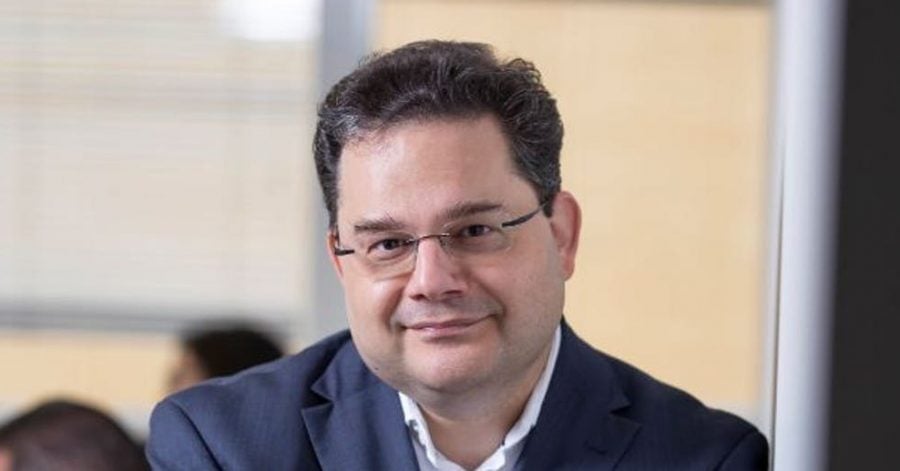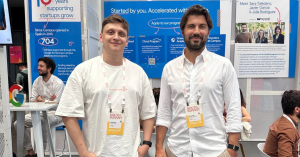Just a few days ago, Viva Wallet, a Greek cloud-based neobank focusing on European SME merchants, raised $80M from the Chinese technology conglomerate Tencent, the European Bank for Reconstruction and Development (EBRD), and the international VC Breyer Capital. To learn more about the significance of this round, the plans, and the story of Viva Wallet and get valuable insight into the neobanking ecosystem in Europe, The Recursive team talked with VP of Strategy and Business Development, Yannis Larios.
Opportunities ahead for neobank startups seem promising as data shows that the global challenger bank market is expected to grow to $471B in the next 5-6 years and loans are projected to be one of the most lucrative segments in terms of service type. As most of the main global neobanks are focusing on serving personal end-users, some fintech companies are bridging the gap and designing solutions that meet the challenges of SMEs using traditional banks which include inefficient payouts, difficulties in collections, and tracking payments as well as poor invoicing. To bring SMEs into the seamless banking innovation ecosystems, neo banks which function as digital-only banks that have partnered banking licenses and challenger banks which operate with full banking licenses, develop novel payment and lending B2B solutions and open up new opportunities ahead of merchants.
Addressing whole Europe as one fintech space
Viva Wallet started 21 years ago and at the beginning, it specialized in the development of banking software solutions which allowed the team to acquire first-hand perspective and know-how on the banking sector. However, after the 2008 financial crisis, banks slowly began to reduce the investments into technology projects and this is the moment when Viva Wallet recognized the opportunity that it can utilize its know-how and grasp the market opportunities. Larios relates that during that time, the regulatory and institutional landscape was fruitful for financial innovation with the adoption of the EU’s Payment Services Directive (PSD1) which aimed to accelerate the participation of non-banks in the payments industry. By 2011, the directive was transposed to the legal framework of the EU member states and Viva Wallet started to offer its payment services, and some years later on, in 2018, the Greek fintech decided to connect directly to MasterCard and Visa in order to avoid the necessity of any third-party intermediaries.
Yannis Larios shares that their software engineers built the whole infrastructure from scratch on Microsoft Azure, which made them the first fintech company that has developed banking software over Azure and thus gave them full control over the nuts and bolts of the infrastructure. The Viva Wallet team designed everything with the vision and goal to address the whole European market and solve the cross-country payment fragmentation problem that European merchants face. Larios highlights that despite the single market policies of the EU, the level of homogeneity in the payment space cannot be compared to that of the US, and in order to overcome this fragmentation challenge, Viva Wallet set up physical branches in every country. This gives the neobank a unique advantage because it allows them to connect to the local payment systems and provide services tailored to the needs of local merchants.
Fast forward to today, Viva Wallet has expanded its infrastructure across 23 EU countries and offers merchants an IBAN account that is localized and tailored for the specific local payment methods of every country.
Entering the lending and POS verticals
As Yannis Larios explains, Viva Wallet has always remained focused on keeping an eye on the bottom line of its balance sheets and maintaining its profitability, and the next natural step for them is to scale and get more merchants onboard. He outlines that the main competitors of Viva Wallet are local banks because they are the only option for SMEs to obtain an IBAN account. Typically, however, these banks are offering legacy solutions that hinder the growth of small businesses – an area where Viva Wallet has recognized that it can scale and support the merchant in two ways.
First, the company has introduced a solution that allows merchants to accept cards by only using their Android smartphone or tablet as card terminals by using NFC technology. Viva Wallet also allows SMEs to create digital cards and has been certified by MasterCard ”Digital First” which enables the merchants to immediately put their cards on their Apple Pay or GooglePay. It appears that the usability of such point of sale (POS) solutions is recognized by merchants across Eastern Europe as there are many fintechs such as the Bulgarian Phos and myPOS which allow SMEs to turn any NFC-enabled device into POS terminals.
The second method for scaling that Larios points out is connected to the fact that Viva Wallet has its own banking license as a result of the acquisition of Praxia Bank in August 2020 which allowed the company to start lending and supporting merchants to improve their working capital. Therefore, Viva Wallet is bundling together payments and loans to completely digitize the SMEs banking process. Unlike some front-end-focused neobanks such as Revolut that partner with legacy banks and only control the customer experience and the front-end operations, Viva Wallet is built on Microsoft Azure and has full control of its operations from back to front-end.
Moreover, besides payments and lending, Larios explains that at the moment the company is testing the waters of the buy-now-pay-later (BNPL) space which provides consumers with the flexibility to pay in installments and pay some time after they have made the actual purchase. Yannis Larios highlights that Viva Wallet plans to also design and implement BNPL solutions for personal end-consumers by using its own banking license and existing vendors.
What’s ahead: Series D and investing in special purpose vehicles
According to Larios the investor interest that Viva Wallet has attracted from China results from the fact that Tencent has recognized the potential of the neobank to address all the merchants in Europe. By having a single infrastructure, Viva Wallet can be seen as the analogy of Citibank has branches in every country.
He clarifies that in parallel with the latest $80M which will serve as the base for their Series D round, they are separately raising another $500M which is meant to be used for special purpose vehicles (SPV) that will hold the loans offered to merchants. This significant sum will be used to advance the lending service solutions of the company and allow it to keep its valuation by eliminating the need for loans to participate in the balance sheet. According to Larios, the logic behind that is to allow the company to only service the loans instead of keeping them. “You don’t need to have deposits in order to lend. You’re finding investors who wish to lend and then you’re channeling the funds to the merchant,” simplifies the VP of Strategy and Business Development at Viva Wallet.
You may also read:
Bulgarian expense management startup Payhawk raises a record-breaking $20M Series A round








